The Story ⚡
“Ile – Owo” a Nigerian Horror motion picture directed by Dare Olaitan will hit the big screens on June 24th 2022.
In this exclusive, he shares how this project is a primer to his deadly sin’s titled flicks, growing as a young filmmaker and his dreams of breaking into the global market in the next 5 years.
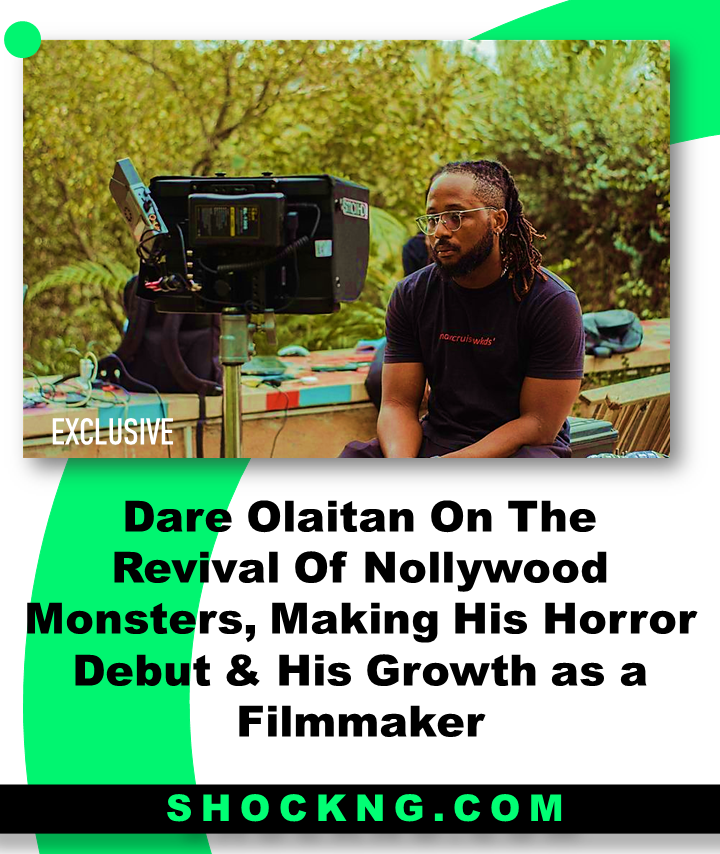
The filmmaker now in his 30s gets his fifth credit as a movie director on this picture and makes his debut for a genre that is rarely produced for the big screens in Nollywood.
Let’s begin.
What was the earliest memory of you watching a horror film and why are you making one?
I remember when I was a kid, I watched a Nollywood horror title that made me have nightmares. It was that good.
So all my life, I guess I have been drawn to horror films and would end up making one.
When I started making films in Nigeria, I knew I did not have the capacity to do what needed to be done at that time. Also didn’t have the authority to jump into horror and make it my first film.
Right now, I think I’m in a place to execute.
Ile-Owo (House of Money) is a practice for my main horror film that has been in pre-production for like 5 years.
Just want to feel this out. Then we would see how it goes and observe how the market responds.
This is a test. Everything really is a test.
For some reason, Nollywood Horror didn’t move over the big screens.
I don’t know why.
From my point of view, the horror genre is one of the most affordable pictures to make. You also don’t need popular faces to sell the picture.
What you are selling is the monster.
And I think that the best way a Nigerian director can break out to a global audience is by making a Horror title with a good monster.
That’s my thought process, very capitalist huh? (Laughs)
Hopefully, it works, in the next five years.
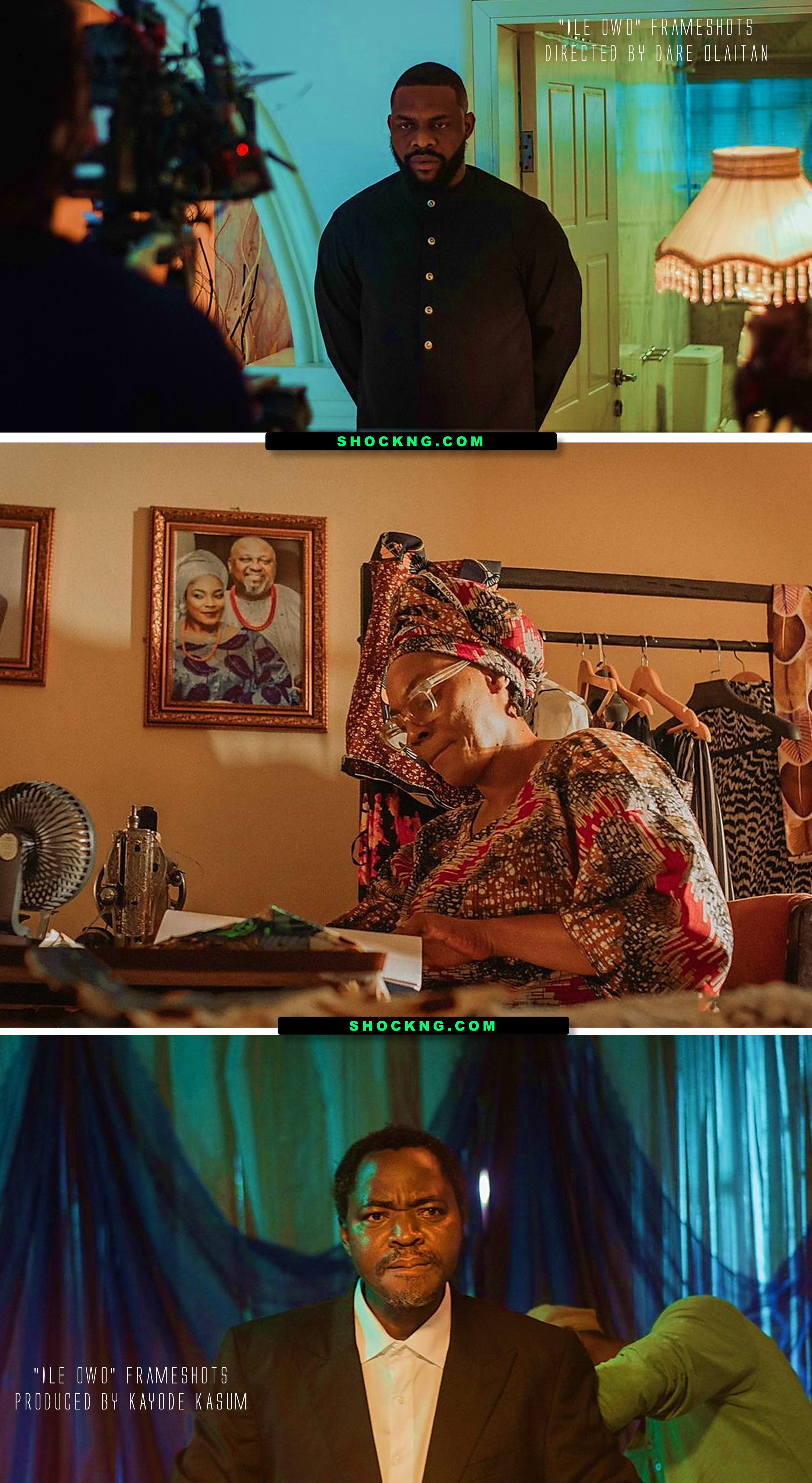
If this is “testing the waters” that means you have a bigger horror picture on the way. What is it all about?
Originally, my plan was to make 7 films. They will be based on the seven deadly sins and will be titled after each sin.
Greed – Ojukororo was my debut. Then “Igberaga – pride” was meant to be the next one but I got sidetracked after making it as I realized that I didn’t have the ability to do what needed to be done.
Especially in terms of my directing versus my writing.
I needed to make my directorial hands stronger before I attempted to make another deadly sin titled pictures.
Igberaga (pride) is the next in line to make and now I have enough confidence to make it. Now I also feel like I have the team, community and authority to bring it to life and make it a success.
It has been on my head for a couple of years and it will be nice for the execution to be done well.
It is a very interesting Nigerian film but not geographically tied to Nigeria if that makes sense.
Let’s talk more on Ile – Owo. What types of Horror structure does it follow?
There are Horror Slasher films aka “Saw” and “Friday The 13th” which focuses on the gore and scares. Then there are really good horror films like “The Shining” “The Hereditary” that are psychological dramas that have a horror twist.
Will be working with this structure to explore themes that affect our society which for me is “class”. I think I’m obsessed with hierarchy within a society. My monster will be used to make a point.
I have found out that a lot of our films end up being about marriage. I see the point of it and it is a very important step in our lives.
I’m in the marriage age now and I get this same push a lot of young people get.
With this insight, I asked a question. What if you marry someone with the worst family possible and not know?? I wanted to show this in the film where a lady’s marriage is used by her parents as a means of getting out of poverty and increasing the family wealth.
This was my thought process in making this title.
Again, Hierarchy of class. I’m obsessed with it. I’ll keep covering it with my movies until I get tired, I suppose.
House of Money isn’t just for the local market. That’s my plan from day 1 when creating it.
Now that we have the option to take our films straight to streaming, and get a chance to cross over. It is an opportunity to definitely utilize and hopefully, it works.
I was watching For Maria which took a chance of straight to streaming and it was so good. I think it would have been rejected by cinemas if it wanted to go to the big screens.
However, now it did well on Netflix – there is now an industry balance to what type of films we can now make.
How do you create fear on the big screen?
Fear is emergent pain or emergent hurt. Or even created from imagining bad things happening to you.
If you see someone in a film who’s getting his/her eye pricked, that’s uncomfortable. And you feel this way because you imagine their eye is getting picked. Fear by Transference.
My approach is to create this emergent pain by creating unconformable moments on screen and then amp it up.
I watched a movie recently and there were dead bodies in the wall and I could not stop thinking about it – what the hell?
So yea, I guess I’m trying to recreate something like that. Something that sticks to the mind of the audience even after watching.
Fear imagined, is better than fear seen.
You guys just wrapped filming; think you got what you desired?
We did the last scene a couple of days and I have seen what the team shot.
And I am very very pleased with what I’ve gotten.
The team is proud of what we shot as well.
This will be a very interesting movie for Nigerians to watch.
Though, I have now understood that there is quite a difference between what I think is good and what the general Nigerians think is good.
But hopefully, I hope to have gotten like a balance this time.
I have to ask, did you kill characters in this film as well?
General Audiences don’t like that at all. Killing Characters.
They really just want to be happy, especially the moviegoers who buy tickets on the big screens. It is entertainment that they seek and I have learnt that.
They want to have a good time.
When my producers read my first ending which I was super happy with – they were like, Dare what are you doing?
It was a sad one. They asked who was going to pay to watch the film?
And I was like fair enough.
So yea. Balance as you grow.
Back in the day in my scripts, I used to kill my characters.
Then I didn’t understand what death was. It was just drama
Now I have seen death up close. And it’s not funny.
My tastes are changing.
But yea, some characters died.
I read your article about turning Nigerian Movies into Dominos Smallie…Does that thought still hold?
So, after making Knock out Blessing, I sat down to share my thoughts on the argument that
“if the cost to see Nigerian movies on the big screen is reduced, we would see an increase in sales”
This argument was just to increase the chance of a moviegoer choosing to watch local films at a price they can afford and also won’t be pained if they didn’t like it.
There is a huge difference between the budget of a Nollywood film to the budget of a Hollywood blockbuster – especially with marketing funds.
With this info, why price them at the same level?
To a degree that thought still holds for me.
Censorship about Occultism and ritual themed movies
I don’t even know what that is because Nollywood doesn’t do these types of movies anymore.
Personally, I don’t even think movies cause moral degrading.
In America, a study was conducted to find out if movies can make children violent? And it was proven false. It is actually the environment that influences behavior, not movies.
The government should actually worry about making its people richer. People do this ritualistic stuff because they are very poor. They need bar (money) to survive.
Poverty is the root of the problem.
Why do you think we are poor?
There are many reasons but I will give you a summarized version.
1963 was the year when things begin to go wrong about Nigeria.
Our politicians became the richest citizens. Got rich too fast without creating value. Mismanaged the economy.
Kleptocracy is what they call it.
Now, we are dealing with years of mismanagement.
Our nation could have been so great but look at where we are right now.
If you could just give citizens light and I’m quite sure that our increase in GDP will be drastic.
Our leaders are really lazy and just bad at their jobs.
Challenges making this Horror project
During casting, some of the major talent that we reached out to were dropping out when it was revealed that the project was Horror. Quite Strange.
But then I remembered that some actors dropped out of “Ojukokoro” because of their pastor told them “They shouldn’t swear in a movie”
So yea, I understand it.
Wait what…
(Laughs) Nah that’s just the wahala (challenge) of making films.
Every day brings a whole new wahala.
Btw what’s your stance on religion and does HOM include a commentary on that topic?
There is a commentary on religion, I suppose.
But I am not the most religious person.
I just used it to frame evil because that’s what Nigerians understand. So that’s one of our strategies to get people to talk about the film and eventually watch it.
During production, what was your number 1 focus on details and execution?
I needed to see the monster and make sure it was good.
It took a lot of time in pre-production in terms of making it achievable within our limited abilities and skillsets.
I know how to draw, so I did a few sketches as I knew what I wanted it to look like and it helped in execution and i worked with local artisans to execute.
Yes, people are skilled here in Nigeria but they don’t do these things daily. They have to practice and get enough prep time to execute well.
In Ojukokoro, I couldn’t get an actor to play the masquerade and always had to solicit someone to do it which was quite stressful.
In HOM, I was able to get a 6-foot lanky guy to play my monster and it was great. He did great.
It looked great on screen.
How did the title come about?
I’m quite bad at titling my movies. I did not title any of my films except Knock out Blessing. This was because I have been having dreams about it for years.
For this title “House of Money” the name of the family is “OWO”
So it really was a play on this name that the title was created – shout out to Ife (producer) who did the naming.
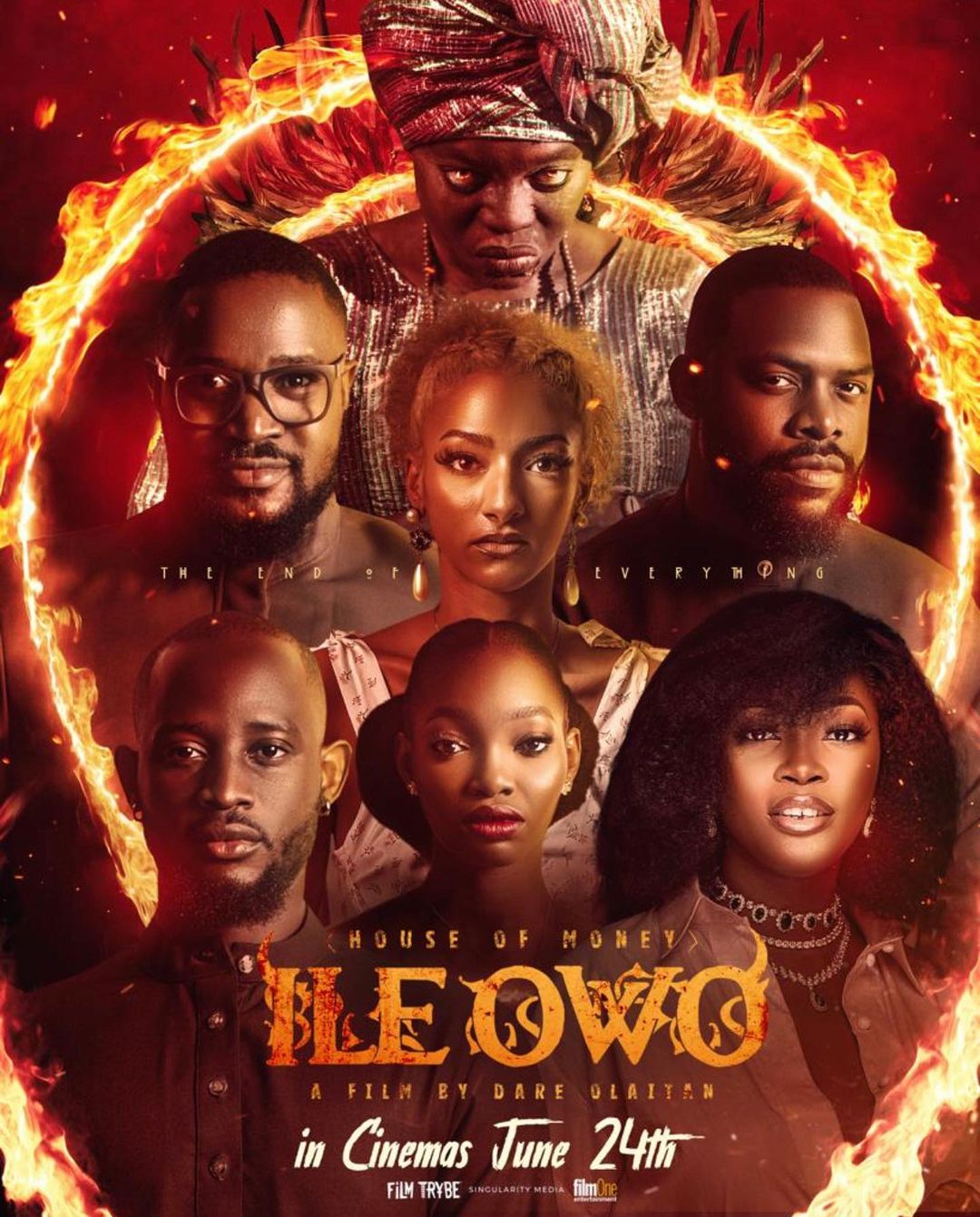
How does streaming affect creators in Nollywood?
(This is my thought. Not that they will be true for this question)
When I was back in America studying Economics. I had to write a paper on emerging industries. During my research, I found out that American companies such as Netflix, Amazon and other companies that truly want to be global will have to come to Africa to gain market share.
That time is here and that’s the direction we are headed.
Some of the biggest shows on Netflix are South Korean and one day we will get there as an industry. Especially how we make stuff with low budgets. In a few years, shorter than I thought before, we will be there, at this position where the world would love our stuff.
Also, one advantage I think we have is our work rate.
The fact that a producer can shoot for 12 days with a low budget and can get something done in these conditions is just ridiculous.
So imagine when a good budget and delivery timeline is increased, our films definitely becomes much better.
This year is such a defining year for Nollywood. A lot of people are making movies that are not the regular movies you see. Now that producers know they can go straight to streaming, they are now taking chances.
I have heard comments of…” everyone is just making comedies”
Do you want them to be starving? There is clearly a demand for comedy. And you can tap into that market to make your money – it’s their choice.
The streaming companies’ entrance into the market can now change this.
People are watching For Maria on Netflix and I would have never imagined that. And they love it.
Before, everybody is trying to make what everyone is watching. This might change.
Can a niche audience become mainstream?
Across the world, the general audience loves comedy. The same is true for the Nigerian audience.
However, there are people that want to watch other stuff.
Nigerians actually want and watch other stuff.
We just have to tell those stories and make them accessible.
I know a lot of people trying hard to cross this barrier. Hopefully, with the streamers, it gets easier.
What are your biggest influences that have shaped your style of writing and directing?
I am still trying to find my voice. I am still learning what influences me.
I am still learning how to tell my own stories. Been directing for 6 years but not like full time, but I am gaining much-needed experience along the way.
I don’t think I can make Knock out Blessing in that way anymore. Why? Because I don’t feel that way anymore. Like my ideas of the world has changed. I am not the same person.
The movies I have done are like remixes of movies I really like.
Ojukokoro was “Reservoir dogs +
Knockout Blessing was “No country for old men + some movie about freedom fighters that I loved when I was a kid.
That’s how movies are made – pick and mix.
Hopefully, I get to the point where I can create and tell authentic stories of my own with my voice.
Right now, I am just being patient and focused on what I want as a filmmaker.
How are you working on getting better at your craft?
I started painting to understand the use of light and color. Before I was all about the story, but now I have come to understand that it has to look good and look exciting.
Also understanding how to cut trailers and getting insights on what people want to watch.
Also getting better at communicating my ideas. If you look at a frame from my movies so far, you can see growth.
Its been 7 years doing this and I constantly remind myself to make sure I get better.
How do you approach collaborations?
I work with people who compliment my good traits and reduce my bad habits. I don’t know everything. This helps me to plug my knowledge gaps and make the final product more robust.
My previous experience has made me stick with this process so I don’t get into problems.
Before, I handled it alone. Directing, Writing and then being the EP – which is a lot of stress to have that much risk on your head.
This wasn’t good, it is hard to make good creative decisions when you are under a lot of pressure.
Film is a collaborative effort; you can’t do everything yourself.
How did you find Kayode and what makes your partnership work so well?
I met Kayode in Paris at the Nollywood week festival, and I saw Oga Bolaji which I thought was really great.
I could never have made a movie like that. And we hit it off from that point and our partnership works.
Kayode is this “Let’s go” person
Me I’m more calculating
So, this trait makes us working together with a good balance.
We have been working on some films this year.
I directed House of Money and he produced it.
Up next is “Obara M” which he directs and I produce.
What should the audiences be expecting to see in “Ile – Owo”?
This is the edge of your seat stuff. Great performances.
I look forward to seeing how the audience accept the film.
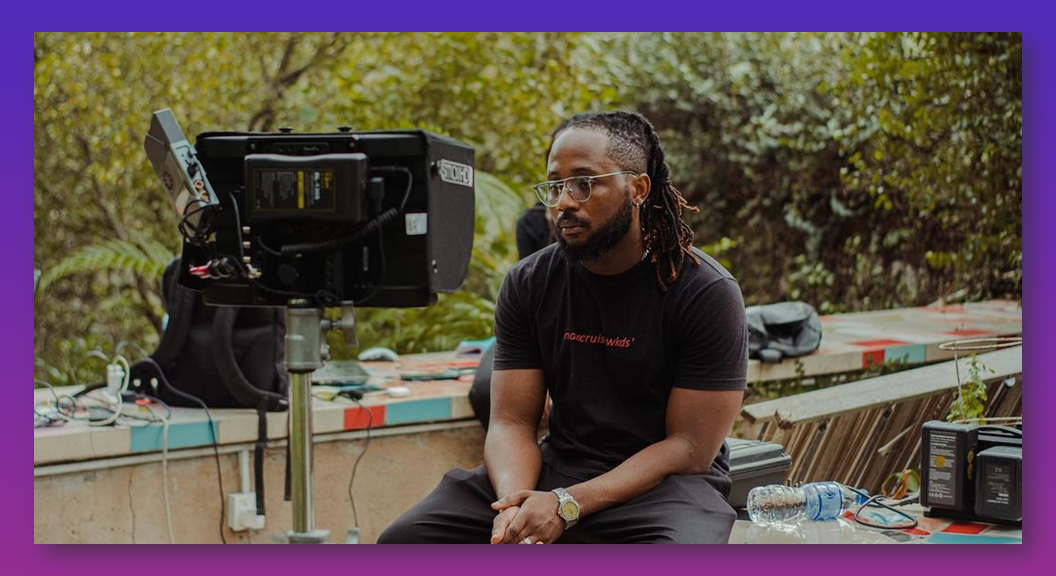
This is a SHOCK Exclusive – Thank you for reading
Shockng.com Covers the Business of Film/TV and the Biggest Creators in Sub Saharan Africa.
Let’s be Friends on Instagram @shockng

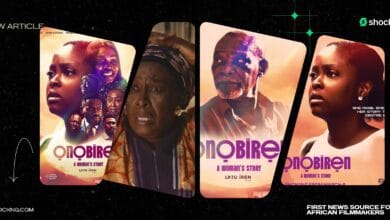
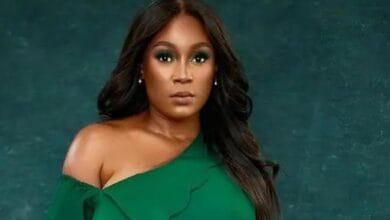
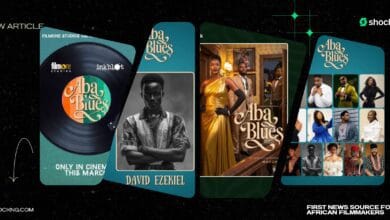
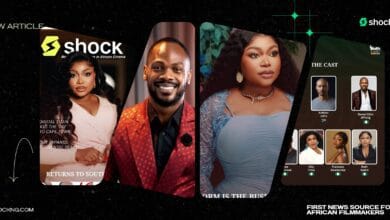
One Comment